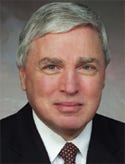Bumpy Road Ahead for von Eschenbach
Originally Published MDDI May 2006 News Trends
May 1, 2006
News Trends
|
Andrew von Eschenbach's confirmation as permanent FDA commissioner may have to overcome potential roadblocks. |
Although the device industry is optimistic about President Bush's nomination of Andrew C. von Eschenbach, MD, as permanent FDA commissioner, controversy on the drug side threatens to overshadow it. Successful near-term device regulation could depend on the knowledge of his subordinate supervisors and how quickly they get him up to speed on device issues.
“Von Eschenbach's career is in the clinical arena,” says Larry Pilot, partner at McKenna, Long & Aldridge (Washington, DC). “On the enforcement side, he's literally a novice and must rely on the chief counsel's office and the associate commissioner for regulatory affairs office. Whether he'll be able to learn quickly and form his own independent position with regard to how the agency should apply resources will be a test for him.”
Both AdvaMed and the Medical Device Manufacturers Association (MDMA) support the nomination and are hopeful about von
Eschenbach's role in the device industry. “Devices are on his radar screen,” says Janet Trunzo, executive vice president of technology and regulatory affairs at AdvaMed. “He knows and is familiar with [the device] industry, and that adds up to a positive position for our industry.”
Devices may be on von Eschenbach's radar, but the strong debate over Plan B, the emergency contraception pill, has become quite a roadblock and could delay his nomination for a while.
“It'll be interesting to see how the nomination process develops. Plan B will be a big issue,” says Pilot, adding, “The agency's activities shouldn't be driven by an issue like that. That's just one of literally hundreds of activities that occur in an agency of this size.” A recent New York Times article suggested that the debate could cause the nomination to hang in oblivion possibly for years.
“It's a darn shame when that kind of issue threatens to hold up, or even derail, the nomination of a candidate like that,” says Bradley Merrill Thompson of Epstein, Becker & Green (Washington, DC). “I blame the media for fanning the flames. They're trying to make a story out of it and are doing so at the expense of a lot of other issues that are deserving of attention.”
The device industry is obviously more interested in FDA speeding up its reviews of 510(k)s and PMAs, or in reauthorization of the Medical Device User Fee and Modernization Act of 2002 (MDUFMA). “The whole user-fee experience hasn't gone smoothly on the device side, somewhat in contrast to the drug side,” says Thompson. “There will be some important issues that need to be ironed out about how that program will look going forward, as well as the agency's overall performance in device regulatory issues.”
During von Eschenbach's presidential budget presentation for 2007, he continued to support MDUFMA user fees and requested a $4.9 million increase in new budget authority for medical devices. The increase would allow FDA to keep up its “highly skilled scientific and professional review staff, and conduct speedier review and approval of safe and effective medical devices,” he stated. Von Eschenbach testified before the House Committee on Appropriations in February.
Mark Leahey, executive director of MDMA, wants to see more assistance in the premarket and postmarket areas. “Hopefully there's sensitivity to the importance of small medical technology companies that bring innovation, [and there will be] assistance in place to help facilitate the development and review of the innovative products in smaller companies.”
Some wonder if von Eschenbach will step up and make improvements, or if he'll keep most of the responsibility on the shoulders of Daniel Schultz, director of CDRH.
“Since he's been acting commissioner, we haven't seen any change in policy in the device area,” says Jonathan Kahan, partner at Hogan & Hartson (Washington, DC). He characterized von Eschenbach's views with regard to devices as a “black hole.”
“He just hasn't shown up much or been terribly involved so far in the device issues,” says Thompson. “Part of that I attribute to the fact that he's only been a part-time acting commissioner.”
Von Eschenbach has been in the acting role since September 2005. He's also the former director of the National Cancer Institute. That experience could help him in the permanent commissioner position. “He seems to have a pretty good sense of how things get done in Washington, so from that standpoint, he seems to be a capable person to fulfill that role,” says Thompson.
Without a permanent commissioner, many people feel that significant issues will go nowhere. “An agency like that has an awfully difficult time moving forward on all but the very most mundane stuff without a permanent commissioner,” says Thompson. “An acting commissioner just isn't nearly as likely to be able to move forward the policy-making agenda at the agency as a permanent one.”
Trunzo agrees. “When someone is in the permanent position in any function, then you can begin to put your own programs in place and put your own stamp on the organization.”
Copyright ©2006 Medical Device & Diagnostic Industry
About the Author(s)
You May Also Like



